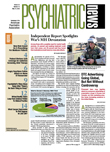The Walter Reed Army Institute for Research has asked the American Psychiatric Institute for Research and Education (APIRE) to develop clinically detailed data on the extent to which the Army's military treatment facilities and clinics provide mental health care to soldiers consistent with evidence-based, best practices (see
Independent Report Spotlights War's MH Devastation).
The study will attempt to overcome the possible underreporting of diagnosis and treatment of psychological problems by obtaining anonymized data from clinicians, said Joyce West, Ph.D., M.P.P., director of APIRE's Psychiatric Practice Research Network.
“We will review treatment consistency with evidenced-based guidelines for PTSD and other conditions,” West told Psychiatric News. West is APIRE's principal investigator for this new study contract, which will take about two years to complete.
The study will look at routine practice in Army behavioral health treatment settings and will include patient, clinician, setting, and clinical characteristics and determine the treated prevalence of PTSD. It will assess how well clinical practice in Army behavioral health settings conforms to evidence-based treatment guideline recommendations, especially how PTSD treatment and other conditions (like substance abuse) are related to attrition from military service.
The study will also examine the assessment and treatment of suicidal ideation and behavior in routine practice and will look at mild traumatic brain injury and relationship problems. Diagnostic practices will be reviewed to identify the accuracy of mental illness diagnostic codes uses in the military medical services.
Finally, the study will lay the groundwork for future research into practice patterns by testing methodology used to regularly collect basic practice-level data in Army behavioral health treatment settings.
Also, APIRE research scientist Farifteh Duffy, Ph.D. will serve as the principal investigator of a recently funded Department of Defense Post-Traumatic Stress Disorder Research Program Concept Award, designed“ to spark new ideas, innovative technologies, and ground-breaking concepts that will drive the field of PTSD research forward.”
The APIRE study will systematically identify and disseminate key evidence-based recommendations to support clinical decision making to mental health clinicians treating soldiers and veterans with PTSD. A concentrated continuing medical education curriculum will be developed, modeled after the Institute for HealthCare Improvement Break-through Series, and derived from current evidence-based practice guidelines for PTSD to prepare clinicians in evidence-based screening, diagnosis, and treatment of PTSD. ▪
